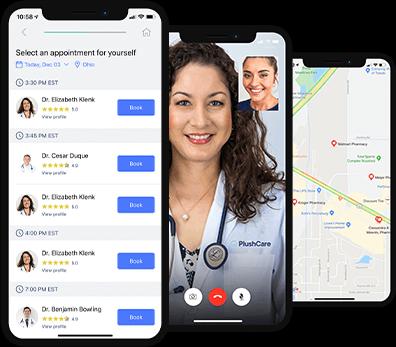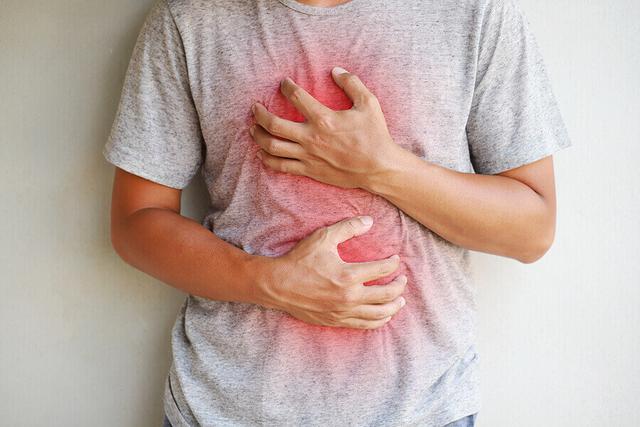Learn About GERD Symptoms, Diagnosis, and Treatment
GERD stands for gastroesophageal reflux disease, which is a digestive disorder that affects the ring of muscle between your esophagus and your stomach called the lower esophageal sphincter.
GERD is common and can range in mild to severe symptoms. GERD becomes a disease when damage to the esophagus causes symptoms. Researchers estimate that about 20% of people in the United States have GERD.
Keep reading to find out more about GERD, including common symptoms, diagnosis, foods to avoid, and treatment options.

1
Book on our free mobile app or website.
Our doctors operate in all 50 states and same day appointments are available every 15 minutes.
2
See a doctor, get treatment and a prescription at your local pharmacy.
3
Use your health insurance just like you normally would to see your doctor.
What are the Symptoms of GERD?
Symptoms of GERD can be mild, severe, short-lasting, or long-lasting, and may cause complications over time.
Symptoms of GERD include:
Burning sensation in your chest
Regurgitation of acid from your stomach into your mouth (acidic material mixed with undigested food)
Stomach pain (upper belly)
Raspy voice
Unexplained cough
Feeling full after small amounts of food
Vomiting
Produce excessive amounts of saliva (water brash)
Lump in throat
GERD can cause complications over time, if not treated. Complications of GERD include:
Ulcer with iron deficiency anemia or vomiting blood
Problems with breathing (asthma, chronic cough)
Precancerous changes on the lining of esophagus
Swallowing difficulties (dysphagia)
Inflammation and stricture of the esophagus
Symptoms are considered mild, moderate, or severe based on whether they impair quality of life. Symptoms may be intermittent (less than two episodes per week) or frequent (two or more episodes per week).
How Is GERD Diagnosed?
A medical doctor can diagnose you with GERD. The diagnosis of GERD can be based on a physical assessment of classical symptoms such as heartburn or regurgitation.
A more thorough diagnosis can be done with the help of diagnostic equipment. The diagnostic exam to confirm GERD is a double-contrast barium swallow examination and an upper endoscopy. A barium swallow test can examine changes in your esophagus and mucosal lining of your stomach to accurately determine if you have GERD.
If you are diagnosed with GERD and have alarming features such as unexplained weight loss or persistent vomiting, you may undergo a more invasive procedure: an upper gastrointestinal endoscopy.
During an endoscopy, your doctor inserts a thin, flexible tube equipped with a camera down your throat to look inside your esophagus and stomach. Your doctor will then take pictures and biopsy samples of your esophagus and stomach lining.
What Causes GERD?
There are classic causes and signs that may determine if you have GERD. These go along with symptoms of GERD at early stages, such as heartburn or regurgitation after eating.
People who are overweight, obese, or have sedentary lifestyles increase their risk of GERD.
Pregnant women, smokers, and second-hand smokers are also more likely to experience GERD.
Overeating and certain types of medications may trigger GERD symptoms.
If you are overweight and have heartburn or regurgitation after eating, talk with your doctor about getting treatment for GERD.
Is GERD Curable or Not?
Yes, GERD can be cured based on the cause. For example, if GERD is triggered by alcohol use and you reduce or eliminate alcohol, it is possible for your esophagus lining to heal.
Aggregating factors should be taken into consideration when treating GERD. If lifestyle changes and medications do not cure GERD, surgery or other medical procedures may need to be performed.
The most common surgery for GERD is called fundoplication. This is when a surgeon sews the top of your stomach around the end of your esophagus to add pressure to the lower esophageal sphincter. This procedure helps to prevent reflux.
Bariatric surgery, which is extreme weight loss surgery, may have a beneficial side effect by reducing GERD symptoms via weight loss.
What is the Difference Between Acid Reflux and GERD?
Acid reflux and GERD are closely related, but GERD is a chronic or long-term condition, while acid reflux may range from mild to severe and be short-lived.
Acid reflux is when stomach acid backs up into the esophagus (the tube that connects your throat to your stomach).
GERD is the chronic, more severe form of acid reflux.
Acid reflux is a symptom of GERD, but these two are often used interchangeably, but not always correctly.
What Foods Should You Avoid for GERD?
Food that are highly acidic can trigger acid reflux and GERD. The following food items should be avoided if you have GERD:
Fried foods
Greasy foods (fatty foods)
Chocolate
Peppermint
Alcohol
Coffee
Carbonated drinks
Tomato sauce
Vinegar
Citrus fruits
Citrus juices
Stick with foods that are low-acid, low-fat, low-sugar, and high fiber to relieve symptoms of GERD and prevent GERD exacerbations.
The following foods are more tolerated by people with GERD:
Whole grains
Vegetables
Fish
Lean meats
Beans
Non-caffeinated drinks
Non-carbonated drinks
Yogurt
Sauerkraut
Kombucha
Bananas
How Long Does GERD Take to Heal?
Depending on the severity, cause, and aggregating factors, GERD can take several days to a few months or even years to heal. In milder cases, lifestyle changes may allow the body to heal itself.
Performing preventative measures and following your doctor’s treatment plan are best to reduce the risk of GERD and to heal faster.
What is the Best Treatment for GERD?
The best treatment for GERD is medication and lifestyle changes. Losing weight can have excellent health benefits, including reducing the risk and occurrence of GERD. Changing dietary habits is another optimal treatment for GERD, as most GERD symptoms are triggered by the foods we consume.
What is the Best Medicine for GERD?
GERD is medically treated with certain types of prescription and over-the-counter medications. The most common type of prescription medications for GERD are proton-pump inhibitors and H2 inhibitors. Both have over-the-counter and prescription forms available.
Proton pump inhibitors (PPIs) lower the amount of acid your stomach makes, allowing the esophageal lining to heal. PPIs can be used for long-term treatment.
H2 Blockers lower the amount of acid your stomach makes, also helping to heal the esophagus.
Mild cases of GERD can be treated with over-the-counter antacids. Antacids relieve mild heartburn by neutralizing the acid in your stomach.
Read: What is Acid Reflux Medicine?
How Do You Treat GERD Without Medication?
You can treat GERD without medication by eliminating aggravating factors from your diet. This may mean dedicating yourself to an elimination diet, in which you slowly introduce foods that may trigger GERD exacerbations so that you know which food items cause irritation.
Other ways to help treat GERD without medication is to lose weight, quit smoking if you smoke, avoid tight fitting clothes (do not squeeze your stomach area), avoid late meals, and do not lay flat with a full stomach for at least 2 to 3 hours after meals.

1
Book on our free mobile app or website.
Our doctors operate in all 50 states and same day appointments are available every 15 minutes.
2
See a doctor, get treatment and a prescription at your local pharmacy.
3
Use your health insurance just like you normally would to see your doctor.
Get GERD Treatment Online
If you believe that you are experiencing the symptoms of GERD or acid reflux, don't wait to get treatment. Contact an online doctor at PlushCare to get the right GERD care plan for you.
PlushCare makes it easy to get GERD treatment online. Just book a virtual appointment with one of our licensed, board-certified doctors. You'll then be able to describe your symptoms and get a diagnosis and prescription from PlushCare's world-class doctors from the top 50 U.S. medical schools. Make an appointment today.
Read More About GERD
Sources:
PlushCare is dedicated to providing you with accurate and trustworthy health information.
American Gastroenterological Association. What is GERD?. Accessed on February 11, 2021 at https://gastro.org/practice-guidance/gi-patient-center/topic/gastroesophageal-reflux-disease-gerd/
Johns Hopkins Medicine. GERD Diet: Foods That Help with Acid Reflux (Heartburn). Accessed on February 11, 2021 at https://www.hopkinsmedicine.org/health/wellness-and-prevention/gerd-diet-foods-that-help-with-acid-reflux-heartburn
Mayo Clinic. Acid reflux and GERD: The same thing? Accessed on February 11, 2021 at https://www.mayoclinic.org/diseases-conditions/heartburn/expert-answers/heartburn-gerd/faq-20057894
Mayo Clinic. Gastroesophageal reflux disease (GERD). Accessed on February 11, 2021 at https://www.mayoclinic.org/diseases-conditions/gerd/symptoms-causes/syc-20361940
Mayo Clinic. Gastroesophageal reflux disease (GERD). Diagnosis and Treatment. Accessed on February 11, 2021 at https://www.mayoclinic.org/diseases-conditions/gerd/diagnosis-treatment/drc-20361959




